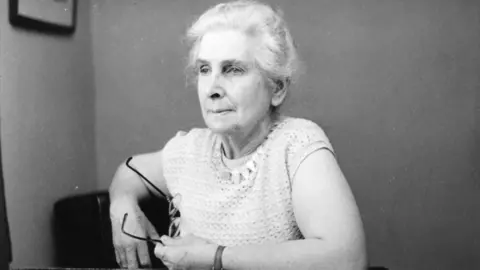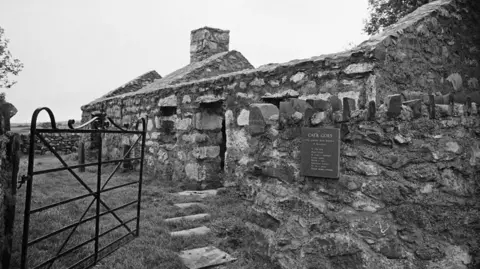Oliver SlowBBC Wales
 BBC
BBCShe was nominated for the greatest award in literature, the Nobel Prize, and was considered a contemporary of writers such as Virginia Woolf.
But 40 years after her death and despite being described as her country’s “queen of literature”, Kate Roberts does not appear as readily on lists of Welsh greats alongside the likes of Dylan Thomas and RS Thomas.
Some suggest not enough of her work has been translated into English to give her mass appeal, while others argue this would result in much of the meaning in her Welsh writing being lost.
So, who was she and why aren’t her major works such as Feet in Chains – an evocative and powerful capture of rural Welsh life – considered Welsh classics like Under Milk Wood?
“She was a major figure in Welsh public life, as well as being regarded as a proper literary author,” said Katie Gramich, an emerita professor in English Literature at Cardiff University who has translated some of Roberts’ work into English.
“She knew the history of the Welsh language, of Welsh literature, and you could feel that in her work – you get a palpable sense of the real world in her writing.”
Producing a vast body of work spanning almost her entire life until she died in 1985 at the age of 94, Roberts’ powerful realist prose captured the angst and struggles of women and working class people in rural north Wales.
She was also an influential critic, journalist, publisher and political activist, playing an important role in the early days of what is now Plaid Cymru.
 Geoff Charles
Geoff CharlesRoberts was born in Rhosgadfan, a village in Gwynedd, in 1891.
Her father was a quarryman, while her mother looked after the family’s farm, Cae’r Gors, which is today a heritage centre celebrating Roberts’ life and work.
Located just outside Eryri National Park, Cae’r Gors overlooks the dramatic, rugged terrain where life and work was dominated by the slate industry when Roberts was young.
Local slate was said to have “roofed the 19th Century world” – including Westminster Hall and half of the buildings in New York in the 1830s – but the riches of this trade did not make their way down to men such as her father who were doing the gruelling dangerous work on the quarries.
This hardy way of life and striking landscape is captured in much of Roberts’ work, particularly in what many consider her masterpiece, the 1936 novel Feet in Chains [Traed mewn cyffion], which tells the story of a slate quarrying family like her own.
“The character Owain is a male version of Kate Roberts. He experiences what she experienced,” Prof Gramich said.
This included spending her early years in a poor, rural Welsh-speaking community, before winning a scholarship to an English-speaking school in Caernarfon.
“That was a huge culture shock to her, and the sense of alienation you get from Owain in the book is something she experienced,” Prof Gramich said.
 Getty Images
Getty ImagesRoberts attended university in Bangor, when few women did, and also worked as a teacher in the south Wales valleys – a job she had to quit after she wed her husband due to the bar on married women in the profession.
She also ran a major printing press and was a prominent early member of Plaid Cymru, the Welsh nationalist party, at its foundation in 1925.
Prof Gramich said that although Roberts’ work has been translated into other languages – including French, Dutch and German – she is not widely-known outside Wales, particularly when compared to those writing at the same time in English on gender issues, including Woolf and Katherine Mansfield.
“They are world-renowned. Kate Roberts isn’t but I think the quality of her work is sufficient to warrant that international reputation,” she said.
But Prof Gramich also acknowledged differing views on translating the work into English, particularly someone whose writing is so rooted in Welsh language and identity.
She said: “Some people would regard my work of translating her work as a kind of betrayal.
“There are those who think it’s worth learning Welsh in order to read Kate Roberts in the original, because of course you lose something when you translate it.”
 Iola Ynyr
Iola YnyrIola Ynyr, a writer from north Wales, said the power of Roberts’ work lies in her ability to look at life in rural Wales with “clarity”.
“She had an ability not to rose tint anything and to speak of the challenges of living in a small rural community,” she said.
“There was a lot of anger and angst and she didn’t romanticise life for working people.”
Ynyr won the 2025 Welsh Book of the Year award in the Welsh category for Camu, a series of autobiographical essays about her battle with alcoholism.
She said the honesty in Roberts’ work inspired her, while she also praised her “observational quality” as well as the ability to write from the female perspective, including “rebellious” characters.
But Ynyr also said the honesty in Roberts’ work could have prevented it from reaching a wider audience, because people in rural communities in Wales had not always been open about the challenges they were facing.
“Because we’re a minority culture, we’ve tended to give a favourable account of our experience in the Welsh language, but I now think there’s more honesty about trauma.”
She said she would like to see more of Roberts’ work translated into English, something that would help “enhance Wales’ literary reputation”.
“It also shows we were being introduced to really adventurous, groundbreaking work in the Welsh language. We weren’t just following,” she said.
Fran Achieson, founding editor of Morfarch Media, said Roberts’ writing, particularly Feet in Chains, perfectly captures the landscape of north Wales.
“I love the smell of it, the smell of the moss in the mountains, the rain coming in. I love the valleys, the mountains, the deserted slate mines. It was so familiar to me,” she said.
She was also drawn to how it captured how difficult life could be, including the “absolutely grim” pre-welfare state for men working on the slate quarries.
“The ending is also very ambiguous, you’re not sure if it’s happy or sad and I think that’s so clever,” she added.
